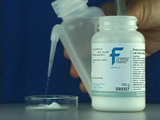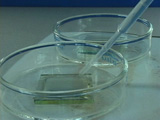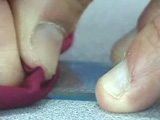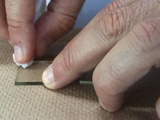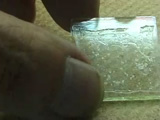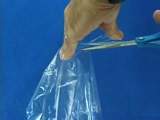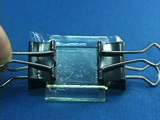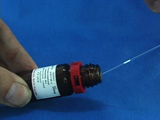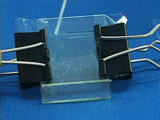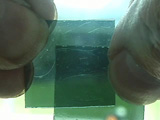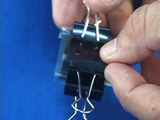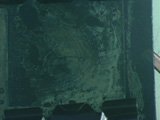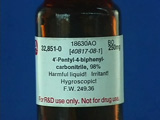
Liquid Crystal Pixel
Modified by Farrell Rogers from E. R. Waclawik, M. J. Ford, P. S. Hale, J. G. Shapter, and N. H. Voelcker, "Liquid Crystal Displays: Fabrication and Measurment of a Twisted Nematic Liquid-Crystal Cell," J. Chem. Educ., 81, 854 (2004) and C. Liberko and J. Shearer, "Preparation of a Surface-Oriented Liquid Crystal," J. Chem. Educ., 77, 1204 (2000).
In this experiment a liquid crystal is oriented between two polarizing filters. The transparency changes when a voltage is applied.
| Procedure | Wear eye protection |
Dissolve polyvinyl alcohol in water, heating as necessary. Use a hotplate to evaporate the polyvinyl alcohol solution onto the conducting side of piece of FTO glass. Prepare two pieces. Rub the PVA layer with a cotton cloth, maintaing the same direction for each stroke. Make sure one edge of the glass is free of PVA by wiping with a damp tissue. The stroke orientation for the second piece should be perpendicular to that of the first piece. The glass should be coated with PVA except at one edge. Cut two strips of plastic wrap. Using the plastic wrap as a spacer, assemble offset glass squares with PVA on the inside and the uncoated edge extending beyond the sandwich to allow an electrical connection to each glass piece. Clamp using binder clips. Use capillary action to transfer the 4’-pentyl-4-biphenyl-carbonitrile liquid crystal into a capillary tube. Transfer liquid crystal from the capillary tube to the space between the glass plates. Obtain two polarizing filters. Crossed polarizers do not transmit light. Add crossed polarizers, one on each side, slipping them under the binder clips. Cycle the pixel on and off by connecting and disconnecting a 9V battery.
Graph %transmittance as a function of time when the voltage is cycled on and off.
- Polyvinyl alcohol, MW 100,000
- 4’-pentyl-4-biphenyl-carbonitrile, Aldrich 32,851-0
- Water, petri dish, hotplate, glass stir rod
- Conductive Glass (1" x 1" x 2.3mm TEC 15 glass) Hartford Glass Co, 735 E Water Street, Hartford City, IN 47348 Phone: 765-348-1282
- Cotton cloth, tissue
- Plastic wrap and scissors
- Binder clips
- Capillary tubes
- Polarizing filters
- Aligator clips
- 9V Battery and battery snap
Equipment
Developed in collaboration with the
University of Wisconsin Materials Research Science and Engineering Center
Interdisciplinary Education Group | MRSEC on Nanostructured Interfaces
This page created by George Lisensky, Beloit College. Last modified June 16, 2013 .
University of Wisconsin Materials Research Science and Engineering Center
Interdisciplinary Education Group | MRSEC on Nanostructured Interfaces
This page created by George Lisensky, Beloit College. Last modified June 16, 2013 .
